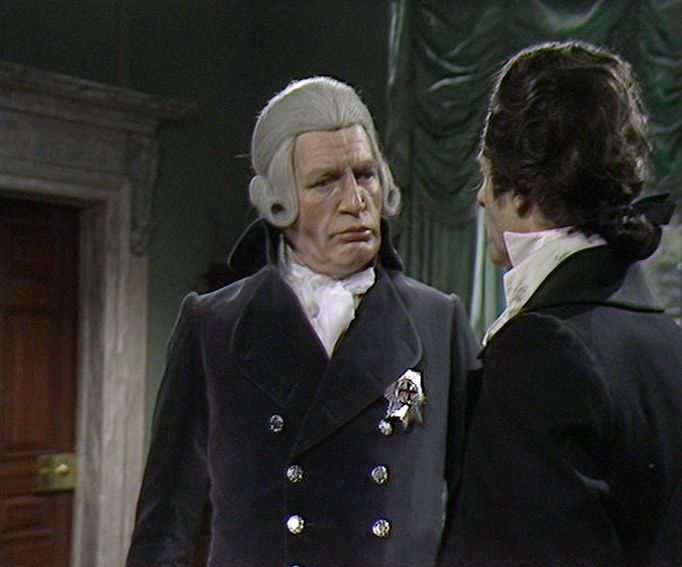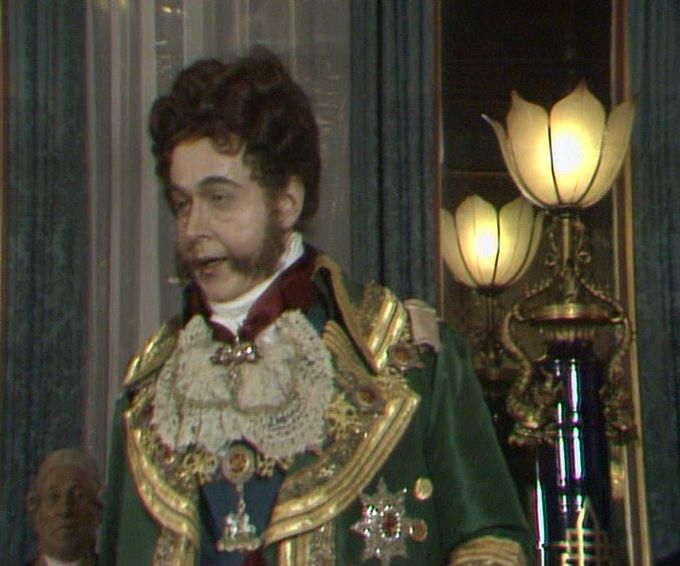
It is 1848. Seven young men active in various artistic fields form a secret group, the Pre-Raphaelite Brotherhood. All are bound together by common aims – chiefly a desire to innovate and so break free from the stifling constraints of conventional artistic thinking. Critical and public acclaim for their work is sparse to begin with though, whilst their unity as a cohesive collective is threatened by their egos and conflicting desires …..
Broadcast in January and February 1975 (comprising six 75 minute episodes) The Love School boasts a cast chock full of talent. Peter Egan, Ben Kingsley, Patricia Quinn, David Collings, David Burke, Kenneth Colley and Sheila White are just some of the leading players.
The opening episode – The Brotherhood – introduces us to several main characters. In these early stages it’s Dante Gabriel Rossetti (Ben Kingsley) who makes the strongest impression. Resplendent in a flowing wig, Kingsley certainly has plenty to work with. Rossetti might be a genius (he certainly believes so) but he’s also capricious and manipulative.
After persuading Ford Madox Brown (Malcolm Tierney) to take him on as a pupil, he then promptly dumps his mentor in favour of Holman Hunt (Bernard Lloyd). And whilst Rossetti and Hunt may later be the prime movers in founding the Pre-Raphaelite Brotherhood, the opportunistic Rossetti is always happy to drop his friends at the drop of a hat if it means advancing his career
And yet to begin with Hunt is always prepared to forgive his friend his sins. Lloyd, like Kingsley, shines in this first episide – bringing to life the engaging and sensitive Hunt. Peter Egan (as John Everett Millais) has less to work with initially, but his natural charm still comes to the fore. Millais is a gifted artist, and has been since he was a child, but recent rejections by the Royal Academy are beginning to sting.

David Troughton (Frederic Stephens), Gareth Hunt (Thomas Woolner), John Quentin (James Collinson) and Nicholas Grace (William Rossetti) skirt around the perimeters of several episodes whilst Patricia Quinn, as the haunting Lizzie Siddal, and Sheila White (the gloriously common Annie Miller) both make instant impressions.
The already strong cast is further enhanced when David Collings and Anne Kidd (as John and Effie Ruskin) appear. An influential critic, Ruskin champions Millais’ work, but the artist becomes besotted with his wife …
Collings teases out Ruskin’s icy detachment with skill. At times Ruskin treats Effie with casual indifference and cruelty, but on other occasions their bond seems very strong. Into this strange and dysfunctional marriage comes Millais, as open and eager as ever.
Given the lion’s share of episode two, Egan is excellent – showing us how the always indulged and spoilt Millais becomes increasingly confused by the signals he’s receiving from Effie (they eventually marry following her acrimonious divorce).
One way of marking the passing of time is to keep an eye on the false beards and moustaches which suddenly appear. Hunt, for example, after travelling abroad for several years returns with an impressive beard and then reaffirms his intention to marry Annie. He’s paid for the guttersnipe to receive the best education possible, but has this turned her into a lady fit for polite society?
Speaking of false beards, there’s an excellent example courtesy of Desmond Llewellyn as Mr Coombe. Elsewhere in this third episode, Seeking The Bubbles, Egan sports a bald cap as Milliais grows older. Acting under heavy make-up was something Egan did a lot of during the 1970’s (see also The Prince Regent).
It’s slightly disconcerting the way Millais and Hunt age so rapidly. One minute they’re in hale and hearty middle age and the next they’ve been transformed into doddery old men. It’s a shame to see them go so soon, but on the plus side it means that Rossetti then reappears to dominate the second half of the serial.
Two notable actors, Kenneth Colley and David Burke, make their first appearances in the fourth episode (Remember Me). As Edward Burne-Jones and William Morris (who is usually referred to as Topsy) they may come across as two of the oldest undergraduates ever seen, but in their early scenes both manage to convey an appropriate degree of youthful enthusiasm when meeting their idol Rossetti for the first time.
Some delightful comic scenes then develop. The pair may be obsessive admirers of Rossetti, but Topsy especially finds it easy to pick holes in some of his more recent work.
Rossetti’s tender relationship with the physically ailing Lizzie generates some compelling moments. Despite his numerous sexual conquests elsewhere, he does seem to be genuinely in love with her. Although the fact he’s content to leave her alone all day, suffering silently, whilst he’s out and about enjoying himself tells its own story. After being absent in episode three, Kingsley comes roaring back to life in this one.

Writing credits for the serial were shared between Ray Lawler, John Pebble, Robin Chapman and John Hale (one apiece from Lawler and Pebble, two each from Chapman and Hale). Chapman’s two episodes – four and five – are especially interesting. Depicting the rise and fall of Rossetti, both are compelling (although once again, the ever-growing false beards sported by several key characters can be a tad distracting).
Despite being largely studio bound, the milieu of Victorian England is very efficiently brought to life. The way the production uses ambient noise (such as horses and carriages clopping past outside) is an effective way of creating an immersive atmosphere.
There are several eye-catching directorial flourishes. At one point the picture is speeded up to suggest a frantic burst of activity from several of the artists – although this isn’t entirely convincing (it rather brings to mind Benny Hill). Rather more memorable is the moment when Patricia Quinn’s mouth is overlaid on a painting of Lizzie. This is a traumatic scene for the hallucinating Rossetti, convinced that his dead love has returned from the grave to taunt him.
Even with the lengthy running time, some stories feel slightly undeveloped (we hurtle very quickly through Milliais’ life, for example). But with multiple colourful characters jostling for position it’s not really surprising that some fare better than others. Ben Kingsley’s Rossetti (who appears in five of the six episodes) emerges as the first amongst equals.
The Love School is deftly able to impart an appreciation for the works of the Pre-Raphaelite Brotherhood whilst at the same time not shying away from the multiple personality flaws which infected its leading lights (this makes for excellent drama of course).
Something of a neglected gem from the mid seventies, it’s yet another quality title that’s been brought back into circulation thanks to Simply. An absorbing experience from start to finish, The Love School is worthy of your time.
The Love School is available now from Simply Media, RRP £24.99. It can be ordered directly from Simply here, quoting ARCHIVE10 will apply a 10% discount.













